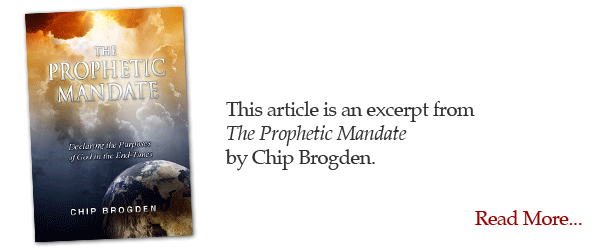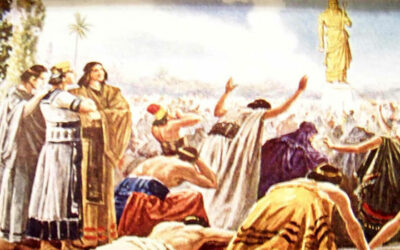The idea of a Remnant is not without its historical examples. Let us define exactly what a Remnant is. Simply put, a Remnant is this: a person or persons who fulfill the Lord’s Purpose for the Whole when the Whole either cannot or will not fulfill it. As an example, look at Noah. During a time when violence and sin filled the whole earth, here is one man who alone is righteous and pleasing to God. The Lord judges mankind with a flood, but does not make a full end. He spares Noah and his family and makes a new beginning with them.
Another good example is Elijah. He complained that since he was the only prophet left, he was better off dead, so he asked God to take his life. God replied, “I have reserved for Myself seven thousand people who have not bowed down to Baal or kissed him (I Kings 19:18).” What an awesome Lord! The entire nation belonged to the Lord. Technically speaking, they were His chosen people. But in fact, only seven thousand of them were truly faithful to the Lord’s Thought and Purpose for them. They had not worshipped any idols. It is a comparatively small number, but certainly more than Elijah thought.
The Remnant Principle is found not only among the righteous. You remember that when Abraham made intercession for Sodom he was able to convince God to spare the entire city if ten righteous people could be found. Unfortunately for Sodom there was no Remnant, not even a little handful of people standing in agreement with God’s Purpose, and so the city was destroyed. Remnants can make a difference between life and death, between salvation and destruction.
Anyone could have had the place in God that Noah had. God did not have a quota for the faithful in Israel that stopped at seven thousand people. The Remnant is not a closed group. I heard someone say this many years ago: anyone can, everyone won’t, but somebody will. That is the gist of it, you see. There is a whole doctrine called Remnant Theology, but that is not what we have in mind here at all. Let us be clear: a Remnant is not an exclusive, elitist circle of super-spiritual saints. Not at all. The promises are made to the “whosoevers”. Anyone can be a friend of God! Anyone can overcome! But we know that everyone will not. Why won’t they? I wish I knew why, I wish I could explain it, but I cannot explain it, and I just know it is a fact that everyone will not go on with God. We know it from history, we know it from looking around us right now. Everyone is not going to press into God, everyone is not going to seek His Kingdom, everyone is not going to lay down their life and follow Jesus. Not that they CANNOT, but they WILL NOT. There is nothing set in stone that says you are destined to be an overcomer, but these other people are not. No, everyone is destined for it, but how many will actually go after it? Anyone can, everyone won’t (in fact, a large majority will not), but SOMEBODY will. That group of “somebodys” who will is the Remnant.
The Remnant surfaces again in the Book of Revelation, and they are called Overcomers. The Lord addresses seven churches, and makes a special invitation to “he that overcomes”. Six of the seven had serious spiritual issues that needed immediate correction; Philadelphia, the one exception, was undergoing tremendous persecution. But if we read through these messages we see clearly that the Lord is calling for a Remnant to overcome. Then the individual identities of these seven churches seem to fade away from that point forward and from there all we hear about is the Overcomers.
The Remnant in Israel
How does the Lord get the attention of His people? First, He sends us His Word. If we will not hear His Word, He sends us the prophets. If we will not hear the prophets, what then? Quite simply, the Lord will have to use our circumstances to get our attention. And in the case of Israel, when every other, shall we say, “diplomatic” solution had been struck down and rejected, the Lord said, “It is enough. I will have to make a new beginning. I will judge My people and accomplish My Purpose through a remnant, a small remainder of faithful ones. No, I will not make a full end, but I will cause all of them to pass through the fire of affliction.”
The Lord had done this on a smaller scale many times before. When we read the Book of Judges we see the pattern. The people fall into idol worship and the Lord allows their enemies to overcome them. After a period of suffering they cry out to the Lord, He sends them a deliverer, and they are set free. Things go well for a time and then the vicious cycle repeats itself. Just look at the longsuffering of God! All of these things are meticulously recorded for us.
The Book of Daniel chronicles one of the lowest points in Jewish history. The nation of Israel had experienced a steady spiritual decline over several generations. The Lord had a significant controversy with His people. You know that Israel was to represent the One True God, the Creator of all things. As such, they were to be a people set apart from every other nation on the earth. All other nations worshipped idols; Israel was to be the example and the means through which the Lord would be able to reach all the idol-worshipping nations. Israel was the first monotheistic nation in the world – that is, they only worshipped One God, whereas the other nations worshipped many gods. So the entire nation of Israel was to be a corporate remnant: a nation created to fulfill the Lord’s Purpose for all the nations (the Whole) when the Whole either cannot or will not fulfill it. That was why Israel came into being.
Obviously the nation of Israel could not maintain the Testimony of the Lord if they worshipped idols just like every other nation on earth. They would lose their distinctiveness altogether. The heathen nations were supposed to be able to look at Israel, see the great blessing, wealth, peace, prosperity, and presence of God she enjoyed, and forsake their idols in favor of the Living God. In short, Israel was to be a living witness. Of course, we know that Israel failed. Instead of maintaining the Testimony, she sinned just like all the other nations, worshipping idols. Even a cursory reading of the Old Testament shows that this was at the heart of God’s controversy with Israel. How could a set-apart people bear witness to One God when their lives contradicted the very truth they were supposed to have?
Time and time again the Lord would send prophets to warn them. There were bright periods of reform and purging of idols, but the general direction of the nation was downward. As time passed they grew even more wicked and reprobate than the heathen nations. This presented quite a “problem” for God, although of course that is not the best way to put it, but it is a good way to describe it. Here is a people who are to be a light to the nations, and instead, are actually doing damage to God’s Testimony in the earth. They are no longer exclusive, or separated, or set-apart: they are through and through no different than any other nation. They are commonplace, ordinary, polluted, and compromised altogether.
So what can God do about it? May we say that the Lord is committed to Israel because, quite frankly, if Israel fails, then the Lord no longer has a clear Testimony in the earth. The message to the nations would be, “Israel’s God is weak; He cannot even control His own people. Just look at them! They are no different than we are, so their God must be no different than our gods. The God of Israel is nothing to fear.” Obviously such a situation as this would be intolerable. Unfortunately, everything hinges upon this backslidden, rebellious, disobedient people. The Lord cannot just go to another nation and start over with them. There is too much invested in these people. A relationship has been entered into, and promises have been made – Abraham, Isaac, Jacob, Moses, Samuel, David, all of them have had a stake in this. But more importantly, the whole world is looking to see how the “so-called” Living God (as they said) will deal with His idol-worshipping people. The very glory of God among the nations is in question. How could things have deteriorated to this point? It seems, naturally speaking, that everything is lost.
The Remnant in Babylon
Once all others means had been exhausted, the Lord determined to deliver Israel into the hands of a pagan, idol-worshipping nation – Babylon. The prophet Habakkuk argues with God that Babylon is more wicked than Israel, so how does that establish any kind of testimony for the Lord? How can God let His people be conquered by pagans? But the Lord knows what He is doing. It is almost as if the Lord is saying, “Since you have forsaken Me for idols, I will give you what you want: a manner of life altogether apart from Me and dominated with idols of every kind. I will send you away into a foreign land and you will finally have what you have wanted. Since you want to be like the other nations, since you want to live like heathens, I will give you the opportunity. But I will secure a Remnant, and I will bring them back to their own land, and from henceforth idol worship will never be a problem with Israel again.” Behold the wisdom of God!
Remember when the Hebrews complained that they were tired of the manna and wanted meat? What did the Lord say? He said He would certainly give them meat, and they would eat it until it came out of their ears. They would have all they could stand and it would make them sick. In a similar way, the Lord determined to give them all the idols they wanted as a way to permanently cure them of lusting for idols.
So the Lord brought the armies of Babylon to Jerusalem. The Temple was looted and destroyed, the city was burned, and most of the people were killed. The rest were carried away captive into Babylon. Everything, it seems, is lost. The Testimony is broken down, seemingly beyond the point of ever being recovered. God has “forsaken” His own people and allowed a heathen nation to conquer them. Not only that, but the spiritual center of the nation – the Temple – was gone, and with it the sacrifices, the worship, the priesthood, the Law, the prophets, everything.
But let us get beyond the historical perspective and take a look at things from a spiritual point of view. We must remember that everything points to CHRIST. From the beginning God is working to achieve a particular End, and that is the revealing of Christ and the establishment of a Kingdom. He took one man out of a nation of idol-worshippers – Abraham – and revealed Himself progressively to him. Thus monotheism was born, and from this one man God sought to secure for Himself a nation of His own as something separate and distinct from every other nation. We follow the line through Isaac, Jacob, Joseph, Moses, David, and the kings. It reaches its zenith in David’s reign; that is, Israel most closely resembled what God intended under David. Solomon started out well, but then came that damnable idol worship again! Immediately the nation is divided into Northern and Southern kingdoms, and things go from bad to worse. Eventually the Northern kingdom (Israel) falls, and later the Southern Kingdom (Judah) falls.
From the spiritual perspective it seems that God has failed in His attempt to secure a people for Himself. Can we really appreciate the gravity of the situation? Christ has not yet appeared, and Israel has failed. At this point, satan says, “At last! I knew it would not last. The very idea of a holy nation in the midst of all the other nations of the world! A separate and distinct people! Ha! I believe it is safe to say that we have won. Christ will not manifest Himself, because Israel is no more. We have the victory!” Why did satan hate Israel? Not because Israel was something, but because Israel was the door through which the Christ would come into the world. To destroy Israel before Christ can appear is to essentially kill Him in the womb (Revelation 12:4,5).
Of course, looking in retrospect, we know that the Lord is not going to just let the devil upset His Purpose. What is so amazing about the Lord is that man cannot upset His Purpose either! The Lord has already spoken through Isaiah that Christ would come. But Jeremiah says that the Lord will allow Israel to be held captive seventy years before restoring them to their land. The issue here is not just a matter of real estate. We must see that the issue with God is the bringing forth of His Son into the world, and the place of that bringing forth and revealing is in Bethlehem. The place of His sacrifice for our sins is in Jerusalem. This is already predetermined. So the land must be restored to Israel before Christ can be manifest.
It is at this point in the history of God’s dealings with Israel that the Book of Daniel begins. We begin with the carrying away into Babylon of a Remnant of people. It is important to understand the philosophy of Babylon towards the nations it conquered. When we understand their approach we will better appreciate the analogy between Babylon of old and spiritual Babylon today. When you are conquered by Babylon, they begin to turn YOU into what THEY are.
The Medo-Persians, who followed after Babylon, took a different approach. They calculated that a happy people are a content people and are less likely to rebel, and so they allowed you to keep your religion and your customs more or less intact. That is why Cyrus permitted the Jews to return to their land and rebuild the Temple. But not so the Babylonians. If they worship a certain idol, then you will be expected to worship it too. If they eat a certain way, then you will have to eat the way they do. Since they speak Aramaic, you will have to learn Aramaic. In other words, there is no room in Babylon for anything other than Babylon. You cannot retain your individuality, your own unique perception of things. You will be assimilated into their culture, or you will die.
Now we see at once the basis for a conflict here. A Jew cannot just “be” like every other nation and still be Jewish. Granted, most of Israel had lost their distinctiveness, otherwise they would not have been in this situation to begin with. But we know that if God is going to see His Purpose fulfilled then He is going to have to save for Himself a Remnant. This Remnant will be sorely tested, because where they are heading, it will not be easy for them to maintain any kind of a Testimony. The hope is that somehow, someway, they will remain faithful to the Lord in the midst of universal compromise, and they will successfully come through the seventy years of captivity, return to Jerusalem, and allow God’s Purpose to continue pressing forward towards the revealing of Christ.
All the hopes and dreams of heaven are bound up with this handful of exiles! So much is riding upon this group. Will they be faithful? Will they persevere? Or will they breakdown completely under the pressure of a foreign nation, a pagan society? To be sure, satan and all the spirits of antichrist are closely watching these developments. Israel as a whole may have been destroyed, but as long as these Jews remain there is the chance – albeit a slim chance – that God will be able to see His Plan through to completion. We must understand that all the forces of darkness are going to focus themselves against this Remnant in an attempt to shut up the Testimony once and for all. This, truly, is a momentous and critical period. More than Israel is at stake: the very fulfillment of God’s Purpose and Plan for redemption, the actual coming of the Messiah to establish His Kingdom, hangs in the balance.
Now who would ever believe that with this much at stake the first battle to be fought will be over a thing so insignificant as what to eat? Who would ever guess that the very fate of mankind rested on something as simple as food. But I tell you that most of the people failed in this very first test, this very small test, and immediately disqualified themselves. I pray the Lord will open our eyes to see the principle here!
We have no way of knowing exactly how many were taken away into Babylon. We do know that of this group some younger men were selected for intense indoctrination into the lifestyle and customs of the Babylonians. They were selected to undergo a rigorous program in which they would be educated in the arts, sciences, and religion of a pagan nation. They were to learn a new language and new customs. Even their names were changed, for each one was now named after an idol. Babylon is quickly swallowing them up into its system.
So from the beginning satan attempted to destroy this Remnant. We know that out of all these young men, only four of them raised any kind of objection to the changes that were demanded of them. Only four! Do we mean to say that out of all these young men, everything is resting on four? Yes, that is what we find out from the Scripture. The majority were probably thinking, “I have seen my people killed, my home destroyed, and the Temple burned. We have been brought to this land and we will never see our country again. God has forsaken us. We might as well get used to Babylon. We’re lucky to still have our lives after all that has happened. Maybe if we cooperate we will have a better time of it.”
These boys were appointed a daily provision of the king’s meat and the king’s wine as part of their indoctrination into the Babylonian lifestyle. Most of them quietly accepted the daily provision as part of the program. In fact, what a blessing it is to have food and drink at all! After all, they thought, why should we worry about whether we eat meat or drink wine, or keep the Sabbath, or any other Jewish law for that matter? That way of life is dead and gone. We can’t be Jews here. The Temple is gone, the priests are probably all dead, so it makes no difference. So they took the king’s meat and the king’s wine. This is only symbolic of their final capitulation to Babylon. That sealed it. From that point on they were pretty much lost to the Babylonian system. If they were Jews, it was in name only, because they had compromised themselves.
But there was one young man who would not quietly accept all that was being offered to him. He watched the others sitting at the table around him, and smelled the king’s meat as it was served to each of them in turn, and listened to the gurgle of the king’s wine as it splashed into their goblets. Then and there a decision was made: “But Daniel purposed in his heart that he would not defile himself with the portion of the king’s meat, nor with the wine which he drank (Daniel 1:8a).”
Is Daniel merely jealous for the Law of Moses here, or is there a greater motivation? The point here is really not the meat or the drink, but the purposing in Daniel’s heart not to defile himself. That there is one who would even make such a purpose is astounding, considering the circumstances. The easiest thing to do is to just go along with things, accept them as they are, and not make any trouble. But thank God for that decision! Daniel purposed in his heart – a flame was kindled, and the longer he thought about it, the hotter the fire burned. While the others were eating and drinking, Daniel motioned to his three friends, and whispered, “Eat mine if you will have it – but I will not sin against the Lord in this thing!” And the three brothers, Hananiah, Mishael, and Azariah, agreed that they would not eat the meat or drink the wine either. Hallelujah! This is what the Lord is after – a small company of two or three, gathered together under a covenant that they will stand for the Testimony of the Lord, for something Heavenly, regardless of the cost! But why do you maintain your integrity, Daniel? Do you think you are better than everyone else? What do you hope to gain? What is the point?
Daniel and his friends represent the Overcomers. Daniel purposed in his heart that he would forever and always maintain a certain amount of hostility and resistance to the world system there in Babylon. Not a loud, demonstrative, attention-getting resistance, but a quiet, purposeful, principle-based way of living that would only allow him to go along with things up to a certain point, but then no further. Yes, he might be forced into the Kingdom of Babylon physically, but he refused to be forced into it spiritually! His God and his religion were not bound to a Temple in Jerusalem, to a priesthood or a system of worship. Daniel is saying, “It is true that the Temple is destroyed, Jerusalem is burned, and God has allowed us to be conquered. That does not change the fact that He is the Most High God, the Creator of Heaven and Earth. I am not changing my witness just because of my circumstances. I will maintain the Testimony of the Lord, even if it means death. I would rather die than defile myself and be disqualified from God’s Kingdom. Someone, somewhere on this earth must represent the Kingdom of God, and though I may be IN Babylon, I am not OF Babylon!” That, in essence, was his reasoning.
The Remnant Today
What is the significance of these things, and what is the application to us today? Simply put, the time in which we live is no different from Old Testament Israel or the New Testament churches of the Book of Revelation. When we survey the landscape of Christendom we see one huge disappointment, an unbelievable immaturity, gross spiritual blindness and deception, and such a mixture and compromise with this world that there is virtually no distinction at all between the natural, the soulish, the fleshly, the carnal, and the spiritual. I will not spend a lot of time on that, because it is apparent to anyone with spiritual perception. As a whole, the Church has failed to bear the Testimony of Jesus, just as Israel failed to bear the Testimony of the Lord.
“Love not the world,” the apostle John writes, “neither the things that are in the world. If any man love the world, the love of the Father is not in him. For all that is in the world, the lust of the flesh, and the lust of the eyes, and the pride of life, is not of the Father, but is of the world. And the world passeth away, and the lust thereof: but he that doeth the will of God abideth forever (I John 2:15-17).” This is clearly exemplified in Daniel.
Is that not the very foundation of our conflict today? Here we are, with a heavenly calling, a heavenly citizenship, a heavenly Jerusalem, a heavenly Temple, a heavenly Kingdom, but we are “exiled” for now in a world system that is trying every way it knows how to get us to defile ourselves through compromise. Clearly it is doing a good job. Just like those young Hebrew boys, we eat the world’s meat, drink the world’s wine, and generally act in a thousand other ways just like the world as part of the program and do not think twice about it. And we wonder why we cannot maintain a heavenly perspective! We wonder why we are not victorious! If we will purpose in our heart to set our affection on things above, not on things on the earth (Colossians 3:2), then the Lord can do something for us. Until then, we are no different than the world, so why should the Lord do anything on our behalf? What kind of message would that send? Oh yes, you can eat the world’s meat and drink the world’s wine and carry on like everyone else and still have your religion and your God too? Not so!
In the end, Daniel and his three friends were found to be ten times wiser than the best that Babylon had to offer. When we align ourselves with God’s Eternal Purpose then He will take us in and commit Himself to us in a powerful way. Once He has secured for Himself a Remnant then He will ensure that all of heaven backs them up, for they represent all that is meant by, “Your Name be revered, Your Kingdom be established, Your Will be accomplished ON EARTH as it is already accomplished in heaven.”
Of course, such a people separated unto God for holy purposes will be marked by the enemy as well, those spirits of Antichrist that are opposed to God’s Will and Purpose in Christ. We represent no threat to the enemy so long as we are engaged in our own trivial pursuits and little projects. He is not moved one bit by our religious works, meetings, or preaching, for most of this is done without any correlation to God’s Eternal Purpose in Christ. We may bluster about in circles for years and never truly meet the enemy – we do not disturb him, so he does not disturb us. But as soon as we grasp something of the significance of God’s Ultimate Will and begin moving towards a Heavenly Testimony in the earth then we represent a most serious danger to these principalities and powers.
The occasion of the conflict is the very revelation of Christ upon which the Church is built. The reality is that “the gates of Hell will not prevail against” this Ecclesia of the ones who have seen the Christ, the Son of the Living God, by the direct revelation of the Father; but this statement implies that the gates of Hell will certainly TRY to come against this Church that Jesus is building, which is itself a Remnant, a called-out people. Called out of what? Called out of Babylon; in the world, true, but not of the world. In Babylon, but standing for God’s Kingdom, Power, and Glory in the midst of things completely hostile and contrary to that Testimony. It is not a question of geography, but Testimony regardless of geography. We will see this demonstrated time and again as we progress through the Book of Daniel.
Part 1 | Part 2 | Part 3 | Part 4 | Part 5













